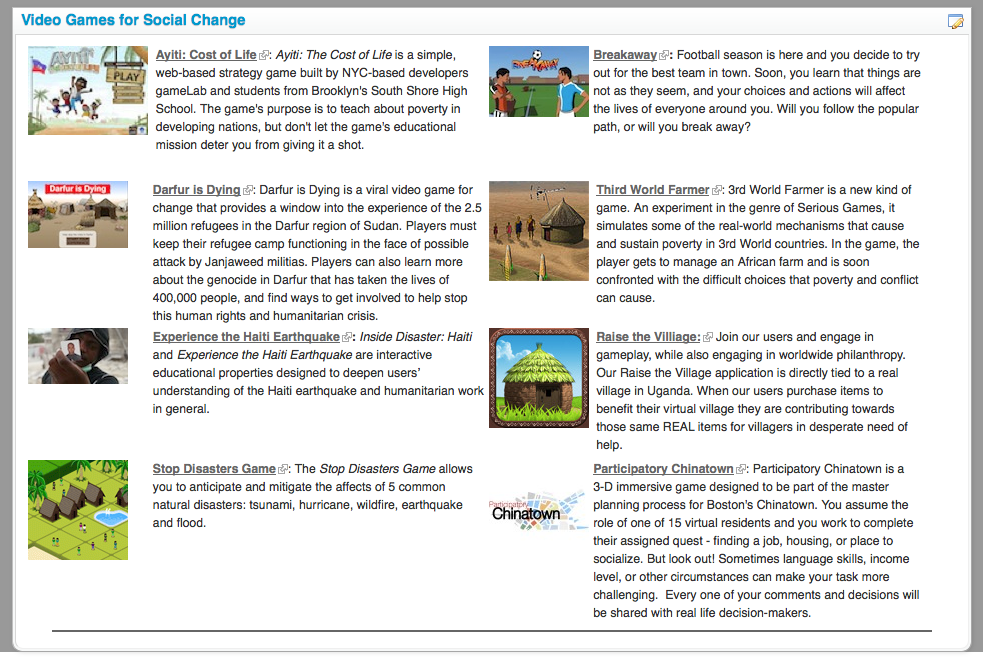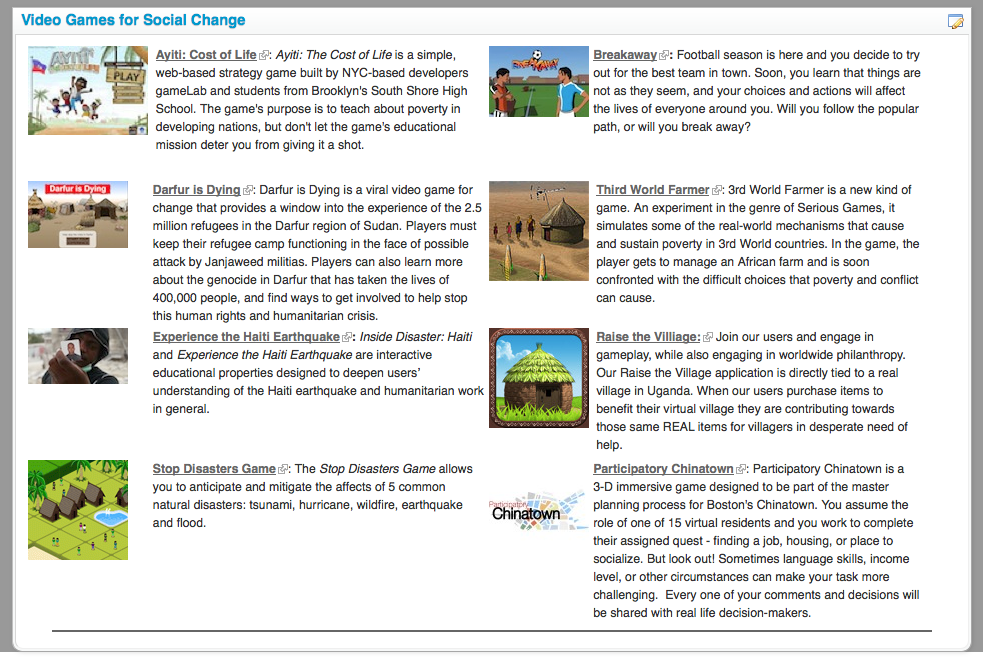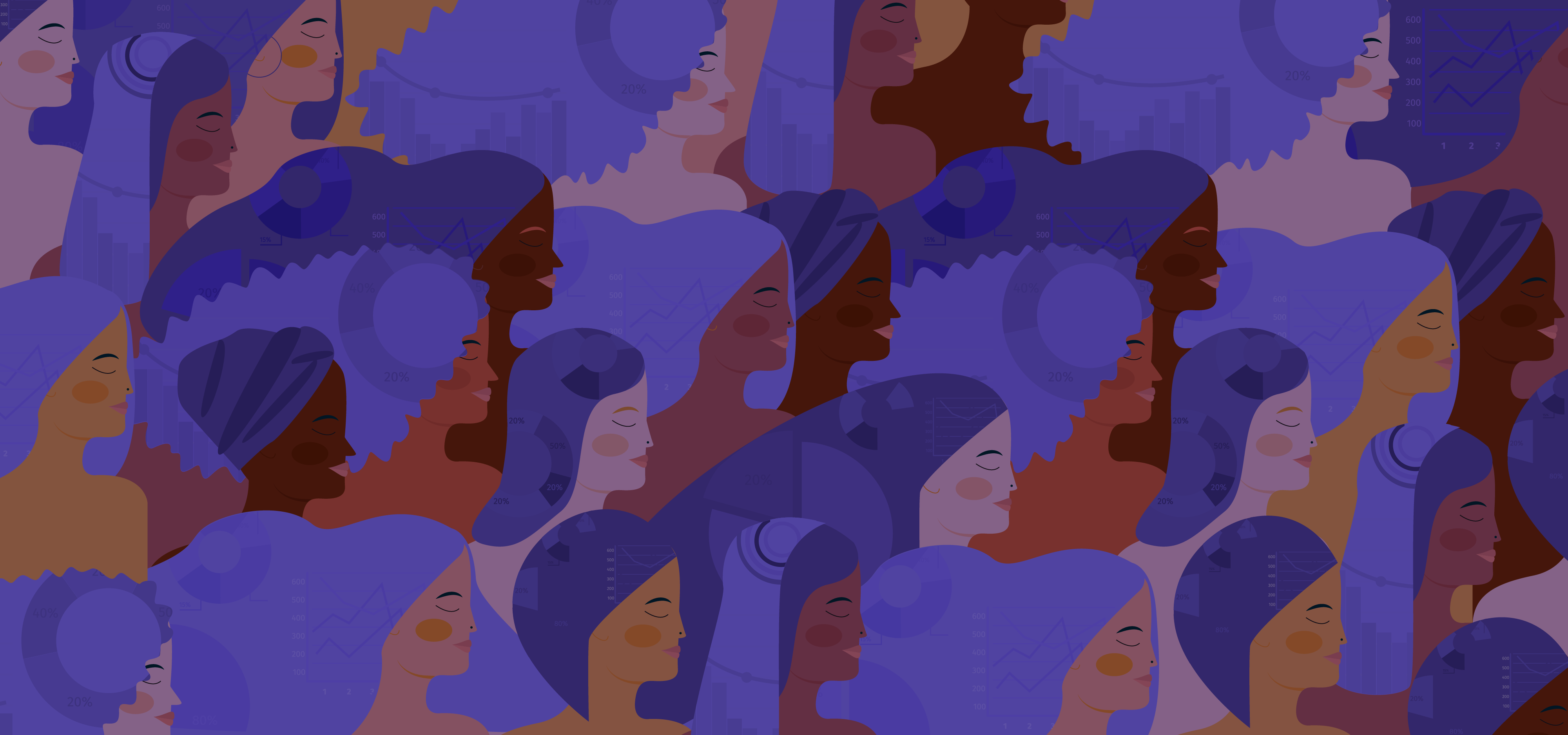 There are many possible goals that games with a purpose can bring, resulting in education/awareness, idea generation, and information management. There may be additional goals but for the structure of this blog post, we will discuss those three. One game we played in class that does not neatly fall into any of those categories is Freerice.com which quizzes the user on a variety of topics, but each correct answer donates ten grains of rice to the World Food Program from the money generated form advertising revenue on the site. The form of philanthropy is but one creative application video games can have for social entrepreneurs.
There are many possible goals that games with a purpose can bring, resulting in education/awareness, idea generation, and information management. There may be additional goals but for the structure of this blog post, we will discuss those three. One game we played in class that does not neatly fall into any of those categories is Freerice.com which quizzes the user on a variety of topics, but each correct answer donates ten grains of rice to the World Food Program from the money generated form advertising revenue on the site. The form of philanthropy is but one creative application video games can have for social entrepreneurs.
The earliest purpose-driven games have been educational and some we discussed in class help bring awareness to a social issue like poverty in the games Darfur Is Dying, 3rd World Farmer, Raise the Village, and Ayiti: Cost of Life. Other games like Stop Disasters by the UN/ISDR can teach users what are proper precautions again different disasters and Breaking Away shows the effects ethical behavior has for a soccer team.
The second type of games with a purpose are those that are designed to generate ideas from the players. In World Without Oil, users are placed in an alternative reality where petroleum resource are rapidly depleting and solutions have to be made in order to keep the world functioning. Evoke is a similar game that sets up scenarios to create social enterprises in Africa. Both of these games not only makes the player think differently about their role in the world, but the ideas can be used for real applications. A final example is Participatory Chinatown, which creates civic engagement when users provide feedback for their physical community while in its virtual copy.
Games that manage information have the ability to “train” computers to recognize patterns which can have real world applications. The website Gwap does this claiming that “By playing our games, you’re training computers to solve problems for humans all over the world.” Another game is Akinator, which plays a game similar to 20 Questions and improves its guesses with each use. Other games are created to crowdsource large amounts information that would be too much for a small team to handle. Foldit is one such example where users fold complex proteins; that data is then used in actual scientific research. Map Mill uses the same idea when it decided to allow users online to classify the large number of pictures that may show the effects of oil spill on the environment.
One gaming success story is described on the website of Galaxy Zoo:
The original Galaxy Zoo was launched in July 2007, with a data set made up of a million galaxies imaged with the robotic telescope of the Sloan Digital Sky Survey. With so many galaxies, the team thought that it might take at least two years for visitors to the site to work through them all. Within 24 hours of launch, the site was receiving 70,000 classifications an hour, and more than 50 million classifications were received by the project during its first year, from almost 150,000 people.
The last few examples may hold the most potential for Crisis Mapping. Much of the challenges after acute disasters or conflicts result in sifting through the enormous amounts of data that needs to be processed in order to find what is most relevant. Although there are efforts to design computer automated system that do this, notably the Ushahidi initiative Swift River, there are times when it is value for human coders. Games are an entertaining way for volunteers to assist with crisis response in large scale numbers with small scale acts.
TechChange does a number of activities with serious games. Read about our unit on video games for social change (AU blog post) in and the recent simulation we ran using FrontlineSMS to simulate a malaria outbreak. All of our online courses this fall will also feature serious games.
Contact the author via Twitter: @tomweinandy


